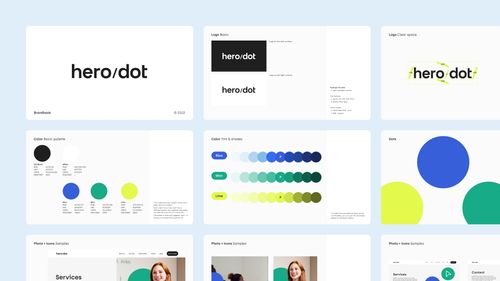Technological Challenges Related to Web App Development and How to Overcome Them. A Gamin.gg Success Story.
Anna Rózga

In the fast-paced world of web app development, tackling technological challenges is a constant endeavour. From choosing the right technology stack and extensive benchmarking to managing high traffic and ensuring robust security, developers face numerous obstacles on their path to creating great digital solutions. In this article, we will share with you our journey of overcoming these challenges while developing Gamin.gg, a groundbreaking web application for competitive gaming. We will explore the technologies in our web app development toolbox and dive into solutions implemented to address benchmarking, high traffic, security, and payment processing. This is the story of how hero/dot transformed Gamin.gg from a visionary concept into a thriving digital reality, as told by our talented developers, Michał Stankiewicz and Miłosz Leśniewski.
Meet Gamin.gg, a Revolutionary Play-To-Earn Gaming Platform
Gamin.gg is the brainchild of HFNGG, a European start-up, in collaboration with hero/dot. At the core of the vision for this innovative competitive gaming application lies the idea to blend the excitement of multiplayer gameplay with the ability to earn money.
What truly sets Gamin.gg apart from its competitors, is that the platform was developed specifically to offer their target audience the opportunity to monetize their passion for gaming in more than just one way. By leveraging the platform's various web app functions, users can compete in numerous skill-based tournaments, stream their gameplay, or even refer friends to join the fun. Moreover, Gamin.gg ensures a fair, secure and +18 environment for its users, complete with an instant reward system that allows for easy withdrawals.
However, turning this visionary concept into a digital reality required our team of expert web developers and business analysts to tackle various technological challenges. Benchmarking solutions, managing high traffic, ensuring robust security measures and a reliable payment processing system were key to overcoming obstacles and bringing Gamin.gg to life.
Web Application Development Toolbox
Before we delve into how hero/dot approached the software development process, let's explore the technologies used to achieve this successful outcome. Here are the frameworks, programming languages, and other tools necessary to develop this one-of-a-kind gaming platform.
- .NET: a Microsoft framework for creating large-scale, dynamic web applications. Best known for its versatility, .NET offers extensive libraries and robust features for server-side processing, while also increasing scalability. Proficiency in this framework was actually one of the client's top priorities when searching for a software house.
- C#: a mature and battle-tested programming language used in the .NET framework. Thanks to its seamless integration with .NET and other Microsoft technologies, C# is known to simplify development processes and boost productivity.
- Vue.js: a lightweight framework for building responsive and composable user interfaces. Alongside React and Angular, Vue.js has been steadily rising in popularity, making it an increasingly favoured choice for frontend development. This framework's advantage is that it provides a component-based architecture. Composables are functions that allow for encapsulating and reusing stateful logic for common tasks, enabling developers to build complex and scalable user interfaces with more efficiency.
- TypeScript: a superset of JavaScript that enhances this programming language by introducing modern features, such as types for variables, functions, and objects. When combined with Vue.js, TypeScript offers swift rendering, excellent performance on web browsers, and facilitates easy updates to the user interface.
- Azure: a cloud computing platform provided by Microsoft. While its popularity equals AWS and Google Cloud, Azure seamlessly integrates with other Microsoft tools, making it the perfect choice for this project. Moreover, it offers a wide range of scalable cloud services, which means you can increase or decrease server resources on demand, allowing you to effectively manage infrastructure costs.
- Terraform: a reliable tool for defining and managing infrastructure as a code, which immensely surpasses manual configuration in terms of efficiency. With Terraform, developers can easily automate infrastructure setup and updates in a programmable, shareable, and version controlled manner.
- Docker: a lightweight and portable containerization platform that simplifies deployment of a web app across various environments. Containerization is a technology that enables packing applications and their dependencies into standardised units called containers, facilitating development, deployment, and execution.

Bringing the Vision to Life with Expert Benchmarking
Creating an innovative and complex web application like Gamin.gg posed significant challenges during the pre-implementation analysis stage. While there were existing gaming tournament platforms in the market, none were as multifaceted as this one. The solution presented in the pre-implementation analysis report emerged from the synergy between the client's crystal-clear vision and the multidisciplinary skill set of our team at hero/dot.
The team on the client side contributed valuable insights based on their extensive experience in the gaming industry. They had a deep understanding of what features were lacking in competitor platforms. Our business analyst took on the task of benchmarking these solutions. While features like user login were relatively standard operations that web developers have implemented numerous times, functionalities such as the matchmaking mechanism required extensive research. Through the strategic partnership between the client and our software agency, the Gamin.gg team felt well-prepared to tackle the technological challenges ahead.
Handling High Traffic with Microservices-Based Architecture
Resilience to high traffic loads was the primary focus of Gamin.gg's design and development process. With thousands of active users competing simultaneously in online tournaments, it was crucial to guarantee each one of them a smooth and lag-free digital experience. How did we manage to keep that promise? The answer lies in microservices.
Think of a web app as a tank, with active users represented by the water inside. As the traffic on the platform increases, the water level rises, posing a risk of overflow. To prevent this, we opted for a microservice-based architecture, composed of multiple independent services. In this software development style, each microservice handles a specific app's functionality, such as logging in, matchmaking, or money withdrawal. You can imagine it as a system of interconnected vessels.
To automate the management of Gamin.gg's microservices and reduce operational burden, we employed Kubernetes. This open-source platform, originally developed by Google, provides tools for load balancing and on-demand horizontal scaling. When microservices become overwhelmed by increased traffic, Kubernetes automatically adjust the number of replicas, scaling them up or down to handle the workload. Additionally, incoming traffic may be distributed across multiple microservices to optimise the utilisation of available resources. In the water tank metaphor, this would mean that when the water level in one connected vessel rises, the fluid can flow seamlessly to another tank, eliminating the risk of overflow.

Ensuring a Secure Gaming Environment with KYC Authorisation
When it comes to casual gameplay, setting up CS:GO servers is typically done by one of the players. However, this situation increases the risk of players cheating and configuring the settings to their advantage. To ensure fair play, we decided to automate this process and implement KYC measures as our primary anti-cheating mechanisms.
KYC stands for Know Your Customer and encompasses a multitude of procedures used to gather and verify information about the clients, primarily in highly regulated industries like banking. In the case of Gamin.gg, KYC took the form of a two-step online verification process. To complete the registration and gain full access to all platform features, including participating in tournaments and earning money, users are required to provide personal information, a photo of a personal document, and a selfie.
This security measure has proven to significantly reduce the number of players who might otherwise feel tempted to cheat under the guise of anonymity. Thanks to KYC and automated virtual server setup, HFNGG managed to establish a level of trust with their customers and provide them with a safe and fair environment for competitive gaming.

Integrating a Financially Safe Payment Processing Service
At the core of Gamin.gg's vision lies the idea of regular gamers earning money through skill-based tournaments. The funding for these gaming matches comes from entry fees that are combined to create a prize pool. The pre-implementation analysis, conducted by our business analyst, resulted in an algorithm determining how to split the prize money among winners. This mechanism calculates the distribution based on the game format and the number of slots available. The game format determines the number of team members (solo, 2v2, 3v3, 5v5), while slots define the number of participants or teams in a given tournament.
While smaller-scale operations may rely on manual payment processing, a large platform like Gamin.gg needed to partner with a renown payment provider to handle all payment mechanisms. However, this is where technological challenges intersect with business and legal considerations. Most payment providers are comfortable accepting payments. The problem arises when it comes to withdrawals, as implementing financial safeguards is crucial to prevent money laundering or other illicit activities.
Finding a suitable payment provider can be challenging for startups. However, after extensive research, Gamin.gg successfully partnered with Adyen, a multinational company whose services are utilised by renown companies like Uber, H&M, and Spotify. Once their service was integrated with Gamin.gg, the players could enjoy user-friendly, secure, and safe payment processing.
In conclusion
Within a span of 12 months, hero/dot successfully overcame the technological challenges and developed the first beta version of Gamin.gg. The platform launched to users in Poland on November 11, 2022. Despite the initial "verification barrier," the platform saw remarkable success, with over 500 users successfully registering within the first two weeks of its launch.
The success of Gamin.gg showcases the power of collaboration, expertise and cutting-edge technology in overcoming challenges in web application development. By leveraging technologies like .NET, C#, Vue.js, and TypeScript, as well as by implementing a microservices-based architecture, KYC authorization, and a secure payment processing system, this revolutionary play-to-earn platform became a digital reality.
If you're looking for a partner who's prepared to tackle even the most complex technological challenges, contact us today! Let's discuss your vision for a web application and discover the possibilities that arise when innovative ideas and development expertise converge.
Need expert assistance with your digital project?

